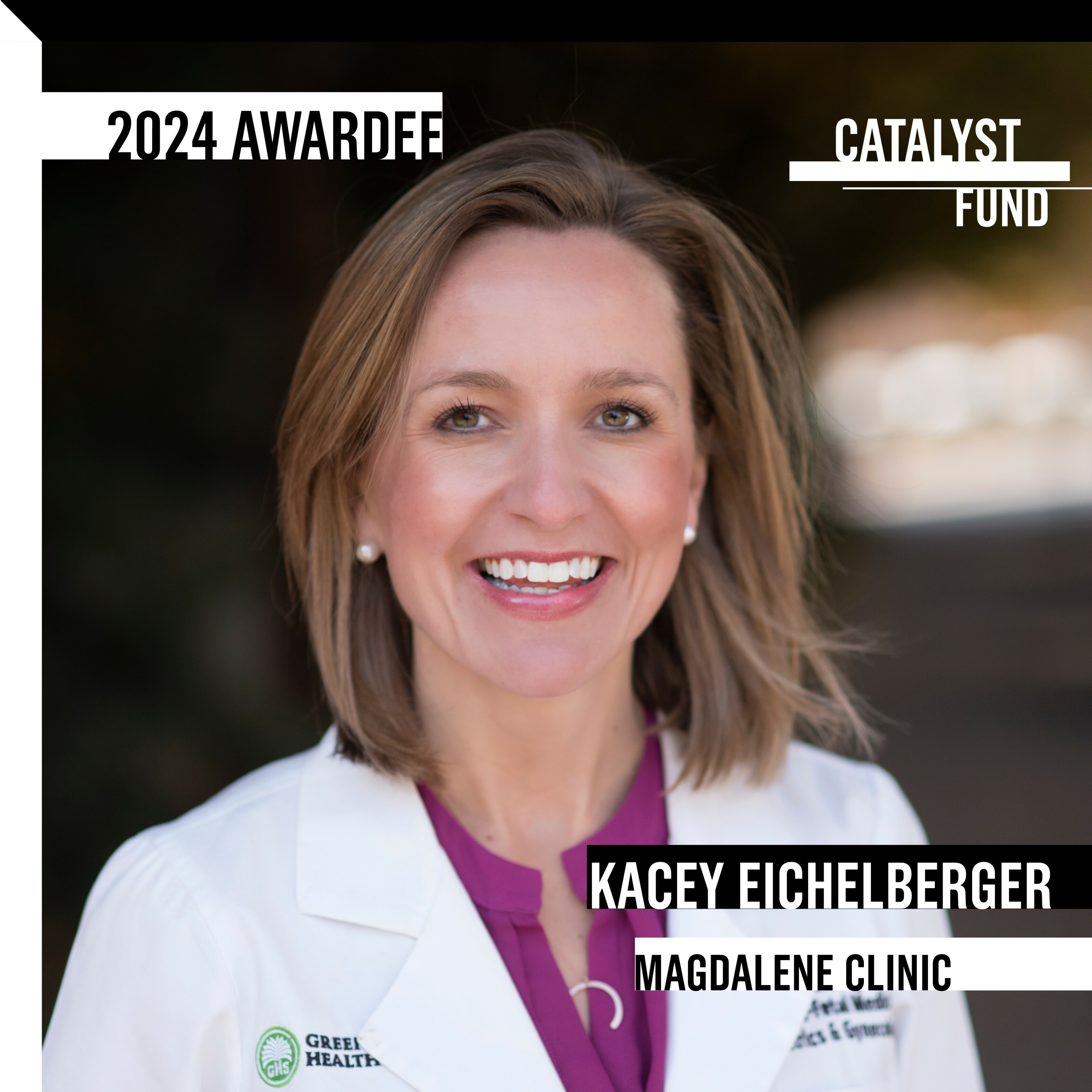Radical Love As Best Practice: Caring for Pregnant Women with Substance Use Disorders
2024 Catalyst Fund Awardee
Kacey Eichelberger
Venture
Magdalene ClinicProgram
Catalyst FundLocation
United States
Year
2024Substance use disorders (SUD) among women in South Carolina are rising; the CDC says pregnant women with opioid use disorder at labor and delivery more than quadrupled from 1999 to 2014. Yet, many obstetricians feel ill-equipped to provide care to these patients. Likewise, patients face shame and judgment due to stigma. This is compounded by the fact that SUD is treated in isolation from pregnancy care, meaning their obstetricians are less familiar with their needs and add a burden of separate visits. These intersecting issues mean pregnant women with SUD seeking healthcare are faced with constant uncomfortable interactions that lead many to avoid care altogether, which can be harmful to both mothers and babies. To address these gaps, Dr. Kacey Eichelberger, a maternal-fetal medicine physician, founded the Magdalene Clinic to reinvent healthcare for these women, focusing on radical love over shame.
Our goal is to say 'you are cared for and valuable. This is treatable. It's not a moral failing. It's a chronic condition we have done a poor job of understanding for years. We're sorry. Let's see what we can do moving forward'
To effectively address this complex issue, Dr. Eichelberger knew she needed help. She partnered with Prisma Health, the state’s largest health care system; the Phoenix Center, Greenville County’s largest drug abuse and rehabilitation center; and Furman University. This formidable coalition enables the Magdalene Clinic to provide holistic and family-centered care to mothers, including a dedication to long-term support and to addressing previous negligence in the healthcare system for this population.
Initially intending to treat 25-30 women per year, the Magdalene Clinic quickly surpassed its goal, serving 570 women from 16 counties since June 2018. The organization's ambitious goal of redefining prenatal healthcare for patients with SUD is unique in its commitment to love, collaboration, and patient dignity. 44% of clinic patients face interpersonal violence, 42% have been involved with law enforcement, and 42% have been incarcerated during pregnancy. Love, as defined by the clinic, is synonymous to capacity-building, with patients encouraged to take an active role in their care and subsequent lives.
90
patients treated within the first year
570
women served across 16 counties
78%
patients discharged with contraceptive of their choice due to education and decision-making power
The treatment process begins with an educational visit, with a nurse who gathers prenatal labs and a full health history, educating the patient along the way about the prenatal care process. Further drug testing determines patient-provider pairings and potential for placement within the Phoenix Center, depending on the severity of the disorder. Additional visits include a patient physical, and a variety of meetings with a social worker, behavioral health counselor, and provider.
On average, patients enter the OB/GYN clinic at 16.6 weeks pregnant, and join the Magdalene Clinic program at 21.7 weeks. The average Magdalene Clinic patient attends nine prenatal visits prior to delivery—more than they would have without the clinic—and high patient experience scores emphasize the value of a loving, safe, and empathetic environment. Patients express deep gratitude for the program, including the education they receive, and the prevention of losing their babies—they are empowered with renewed identities as mothers and as people.
The clinic defines love through big and small moments—this has resulted in more and longer patient visits, due to personal calls from nurses and providers, optional tele-mental health visits, snack provision, and gifts each trimester. Acknowledging patients as the experts of their own lives is extremely powerful, and educating them on the prenatal process alleviates stress and fear. Dedicated teams of social workers, physicians, nurses, and peer support specialists engage in human-centered care, actively listening and checking in with the client regularly. These efforts are incredibly impactful in helping clients realize their ability to thrive.
These women are survivors. The stories they share with us of trauma and resilience is an extraordinary gift. It's honestly a privilege for us to be a part of their journey.

After graduation from Duke University, a stint in Zimbabwe helping people living with HIV solidified Kacey’s interest in becoming a doctor. She is now a maternal-fetal medicine physician, Chair of the Department of Obstetric and Gynecology at the University of South Carolina Greenville School of Medicine/Greenville, and site principal investigator for the NICHD’s Maternal-Fetal Medicine Unit Network, the largest perinatal research unit in the US.
A mother and child who have received care at Magdalene Clinic
Mothers and children at Magdalene Clinic